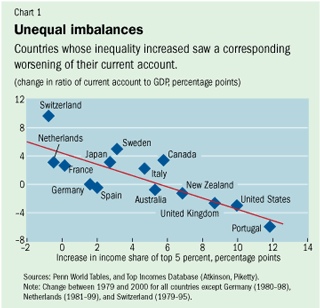
Here's my Top 10 links from around the Internet at 3 pm in association with NZ Mint.
I welcome your additions in the comments below or via email to bernard.hickey@interest.co.nz.
I'll pop the extras into the comment stream.See all previous Top 10s here.
Today's number 8 on IMF research linking high current account deficits to rising income inequality is fascinating. The poor and middle classes borrow offshore and from the rich to maintain their lifestyles...now here have we seen that before...
1. China's debt problems - Chinese legal expert Gordon Chang writes at Forbes about the problems with Chinese local government financing vehicles (LGFVs) that have so many people nervous about China.
Chang wonders how on earth China can bail out Europe and America when it has its own Tsunami of debt about to break inside its borders.
This is the crux of the financial situation and is crucial for New Zealand.
We have benefited from China's continued growth over the last three years, both directly through exports to China, and indirectly through exports to Australia, which never went into recession because of China's growth.
Now China is reaping the whirlwind of all that money printing and lending in late 2008 and early 2009 through high inflation. It has slammed on the brakes, but is realising now that some of that lending was on dodgy projects that won't make economic returns.
China's central government has tried to turn off the taps to real estate markets, but have been ignored by local governments who have been feeding the Ponzi scheme through the sale of land at inflated prices.
It turns out land sales are a major source of revenues for these local governments in China. And they use these revenues to pay the interest on the previous debts...
Watch this space. This might not end well.
Here's Chang with some great local insights:
The case of China Zhongwang Holdings, a giant aluminum producer, illustrates how Liaoning province effectively went into debt in a roundabout manner—and concealed the borrowing. As disclosed in a footnote in its 2009 financial statements, Zhongwang had borrowed 2.3 billion yuan from two Liaoning banks and, as reported by Naomi Rovnick of the South China Morning Post, had “given the money” to a government-owned entity. Zhongwang, based in Liaoning, kept the loan on its books but disclaimed any responsibility for repayment. Apparently, the series of money transfers among Liaoning’s government-owned entities through Zhongwang was intended to facilitate development of the local economy.
The debt problems of northeastern Liaoning may be worse than those of other provinces because it is in the heart of China’s “rust belt,” but LGFVs in other parts of the country are also beginning to experience difficulties. Yunnan Investment Group, the largest financing vehicle of southwestern Yunnan province, has just put restructuring plans on hold after China’s most widely followed rating agency warned of a downgrade in July. Most LGFVs, however, are not rated and so there is virtually no public scrutiny of their activity.
As a result, China’s debt-fueled growth is slowing fast, probably faster than official GDP figures indicate. Electricity usage, perhaps the best barometer of economic activity, was essentially flat this summer on a month-to-month basis. Moreover, export and shipbuilding orders are down. The closely watched HSBC purchasing managers’ index, at its record lowest point, is close to negative territory and headed south.
Xu Lin, a senior official at the National Development and Reform Commission, says there is no need to “panic,” but there are plenty of reasons to think that China’s economy is already landing hard. And a hard landing will soon cause LGFV defaults around the country, which will roil banks.
2. And the pressure is growing - Bloomberg reports that real estate prices are still rising in China, particularly as local governments have defied central government edicts to quieten down their markets.
The local governments don't want to stop selling land and developing apartments because it's the major way to raise money to keep servicing their debts...
Sounds like a ponzi scheme to me.
China’s measures to control its property market are at a critical stage and the nation needs to focus efforts on curbing price increases in less affluent cities after limiting home purchases by each family in metropolitan areas including Beijing and Shanghai, Premier Wen Jiabao said on Sept. 1. Only two cities responded to the government’s July call for added restrictions on housing purchases, as local governments rely on land sales to pay mounting debt.
“Asset prices in China’s second- and third-tier cities are still rising rapidly, as local governments are reluctant to place more strict policies,” Liu Li-Gang, a Hong Kong-based economist at Australia & New Zealand Banking Group Ltd., said in a phone interview. “Especially some western and central cities are facing big pressure to pay out debts, while their main revenue comes from land sales.”
Lower property prices may affect state fund-raising efforts as 40 percent of local governments’ revenue came from land sales last year, according to China Real Estate Information Corp. Some cities, which posted rapid gains in home prices, are facing pressure to bring them down, according to Societe Generale SA.
Local governments, barred from borrowing debt directly, set up 6,576 financing vehicles by the end of 2010 to fund projects such as new roads and airports, according to a report from the National Audit Office on June 27. They had 10.7 trillion yuan ($1.7 trillion) in outstanding liabilities at the end of 2010, of which 8.5 trillion yuan was from bank loans, it said.
“China’s property policies are in a deadlock right now,” said Yao Wei, a Hong Kong-based economist at Societe Generale. “Many local governments have complained that they didn’t want more curbs.”
3. The Australians are now worried - This concern about Australia's over valued property market has gone very mainstream.
Here's the Sydney Morning Herald:
Home prices will halve over the next few years, says the only forecaster to have predicted both the record sharemarket run to 2007 as well as the subsequent GFC. And that was in 1993.
More recently, he also predicted the property collapse in the US, selling his Florida home at the peak in 2005 and renting ever since.
He's predicting a second big drop in the US and Australia's first, which, in four years, could turn McMansions into ghost houses.
4. Here we go - Bloomberg reports S&P has cut Italy's credit rating. Cue the next selloff. And cue the Americans telling the Europeans how to fix the debt problem. With more debt.
The rating was lowered to A from A+, with a negative outlook, S&P said in a statement. S&P said Italy’s net general government debt is the highest among A-rated sovereigns, and the company now expects it to peak later and at a higher level than it previously anticipated.
The decision sent the euro sliding for a third day against the dollar as investor concern rises that European policy makers will fail to contain the debt crisis. Greece’s government plans another call with its main creditors today as it seeks to stave off default, while U.S. Treasury Timothy F. Geithner urged the region to adopt additional tools.
5. Tax the rich more please - A University of Virginia study of happiness in 54 nations that is to be published in Psychological Science has found that the more progressive a tax system is (ie the rich pay a higher proportion of income in tax) the happier its people are.
The results: On average, residents of the nations with the most progressive taxation evaluated their own lives as closer to “the best possible.” They also reported having more satisfying experiences and fewer discomfiting ones than respondents living in nations with less progressive taxes. That happiness, Oishi says, was “explained by a greater degree of satisfaction with the public goods, such as housing, education, and public transportation.”
Higher government spending per se did not yield greater happiness, in spite of the well-being that was associated with satisfaction with state-funded services. In fact, there was a slight negative correlation between government spending and average happiness.
“That data is kind of weird,” Oishi says. He guesses that the misalignment might indicate national differences in the efficiency with which those services are delivered or in people’s relative ability to access them. For example, the U.S. spends more on education and health care than other developed countries, “but its international standing in those areas is not so great.”
6. The Chinese are coming - The Australian reports that almost all the coal in Australia's newest coalmining area, the Gallilee basin in central-Queensland, has been sold to Chinese or Indian interests.
7. 12 billion pound black hole - The Guardian reports more austerity beckons in Britain after a 12 billion pound hole was found in Britain's budget deficit.
8. Who would have thunk it - The IMF reports higher income inequality in developed economies is associated with high debt levels and high current account deficits. We're on the list. HT Doug.
We find that what unites the experiences of the main deficit countries is a steep increase in income inequality over recent decades, as measured by the share of income going to the richest 5 percent of the country’s income distribution.
This increase in inequality has contributed to a deterioration in the richest countries’ aggregate savings-investment balances, as the poor and middle class borrowed from the rich and from foreign lenders. This, along with the other factors mentioned above, can fuel current account deficits.
Indeed, we find that as income shares of the top 5 percent increased between the early 1980s and the end of the millennium, current account balances worsened. For example, in the United Kingdom, an 8.7 percentage point increase in the income share of the richest 5 percent was accompanied by a deterioration in the current account–to-GDP ratio of 2.7 percentage points.
9. So much for a level playing field - This is fun. Forbes reports that China is planning to tax foreigners working in China more than Chinese people working in China. You gotta love that free market and level playing field.
And New Zealanders worry about the Chinese thinking we're being unfair by restricting land sales...
China said earlier this month it will impose a social insurance tax on foreigners working in the country and require them to participate in the country’s social welfare programs. The move will raise the cost of hiring foreigners and “may result in a decrease in the number of foreign workers in the long term,” according to a report in the Shanghai Daily, the city-government published daily newspaper.
Foreigners will be taxed 11% of their salary, while employers will contribute 37% of their salary to the state, the newspaper said.
The new taxes required to be paid by employers will not be refunded, experts said, suggesting that one aim of the new rules is to force businesses that hire foreigners to increase their payments into China’s underfunded social insurance system. The tax increase will also tend to deter hiring of foreigners in China by raising the cost of doing so.
10. Totally Jon Stewart on the collapse of green jobs company Solyndra
18 Comments
Very interesting piece from the Spectator on the bursting of the global bond bubble - 'This is going to hurt'.
http://www.spectator.co.uk/essays/all/7238833/this-is-going-to-hurt.tht…
The comments are interesting - note some saying it wont relly matter as nations will just print and buy their own bonds - I rather think that will lead to hurtful outcomes as well.
re 6. China has become the biggest importer and biggest consumer of coal in the world - to the point that it now surpasses the rest of the world combined.
http://europe.theoildrum.com/node/7123
can someone define "rich"
Cullen's definition was about $60k plus per annum so anything above average wage if you agree with him.
National's definition seems to be about $70k plus per annum.
Goff has upped it to about $150k plus per annum.
I think Obama says it's $1m.
The majority of New Zealanders - anyone who earns/has more than them?
A definition might be had my refering to how many people you extort your income from:)
Rich or well off.
To paraphrase Dickens, i consider myself well off because i earn more than i spend.
At my Baby Boomer time of life and in this nasty economic time this often doesn't say much.
But I think you will find that an awful lot of people in NZ think this way too.
Somebody who can afford everything that you cannot.....
Its easy for China to save the world . They use Monopoly money inside China , and earn real money from us and the rest of the world for their exports . The net effect is that they have US $, Euro and Yen income and no labour expenses, because workers are paid in Monopoly money.
Its the most ingenious rort on the planet .
I know Greece isn't mentioned above - but interesting that Nouriel Roubini now thinks Greece should begin an orderly default, exit the Euro zone and return to the Drachma.
http://www.economonitor.com/nouriel/2011/09/19/greece-should-default-an…
"Like a broken marriage that requires a break-up, it is better to have rules that make separation less costly to both sides. Breaking up and divorcing is painful and costly, even when such rules exist. Make no mistake: an orderly euro exit will be hard. But watching the slow disorderly implosion of the Greek economy and society will be much worse."
Keep in mind that 'The Great Depression' actually resulted in a redistribution of wealth, that had at the time accumulated at the top.
I think it comes down to the fact that the parasites kill their host.
scarfie - like this?
http://thearchdruidreport.blogspot.com/
You should read 'Harpo Speaks', and 'Grouchos Letters', about '29. They believed that they'd 'lost' money too - despite the fact that they'd 'made' it gambling on stock rises.
The Great Gatsby followed, but you're right, it isn't enough, just as taxing the rich - while a valid move - isn't 'enough' either.
#3
Harry Dent, who runs the US-based forecaster HS Dent Foundation, isn't alone in predicting property prices will collapse.
You've got a friend in Bernard Hickey mr Dent:) Better invite him over for a coffee Bernard, just don't invite Amanda.
cheers Scarfie
Actually you could play dirty Bernard and put the temptation in front of Amanda in order to secure a win with your little wager:) But I am sure you are a gentleman and wouldn't do that.
Now the Greek PM is talking about having a referendum on staying in the euro...
This could all get very ugly very soon...
http://www.reuters.com/article/2011/09/20/us-greece-referendum-idUSTRE7…
cheers
Bernard
Surely it's getting to the point where a default at least has an end to the tunnel. At the moment there seems no way out.
Markets have priced in a 91% chance of defaut, so the real question is the size of the haircut. If it's less than 50% maybe the markets will actually bounce.
Greece default is a certainty and can happen within this month :
Note : 1. Greece onre year bond is now trading at 110% (after a high of 140%) This is a sign that bond traders and investors takes default as certain.
2. Greek goverment will refuse to implement the additional measures insisted by the Trioka (eg fire 25,000 employees immediately) on grounds of sovereignity and the like.
3. IMF, EC and EMSF will refuse to hand over the 8 billion due and Greece will then declare default when they cannot pay the amount due in October either to bondholders and goverment employees.....
What we are seeing the past few days is just a charade to show the populace that "everybody" is doing "everything" they can to solve the problem but to no avail due to :
The terrible and blood thristy Germans etc etc (version by the Greek)
The terrible unreliable and untrustworthy Greek goverment (version by the IMF, EU )
.
You have to address the underlying problem. Which isn't a monetary one.
From here on, we repeatedly hit the ceiling, and after a while it becomes lowr each hit.
lhttp://earlywarn.blogspot.com/2011/09/global-trade.html
(the graph is correct, his interpretation is not).
Strange how we raised a generation who thought the 'markets' and 'growth' and 'wealth' were somehow superior to, and irrespective of, the physical planet they were being worshipped on.







We welcome your comments below. If you are not already registered, please register to comment
Remember we welcome robust, respectful and insightful debate. We don't welcome abusive or defamatory comments and will de-register those repeatedly making such comments. Our current comment policy is here.